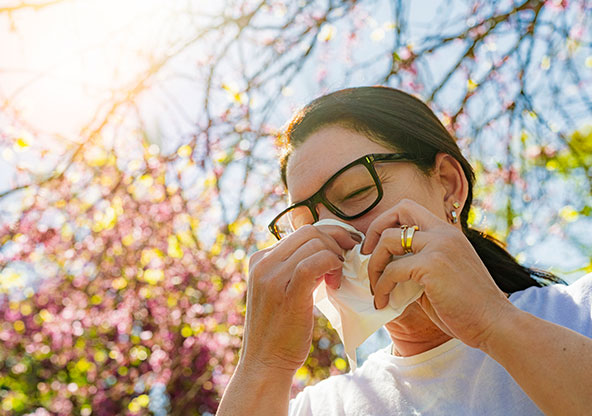
Allergies and Asthma: Breathing Easy
Asthma and allergies are two common conditions that often overlap. While they share similar triggers like pollen, dust, and pet dander, the way they affect your body can be different. Understanding the connection between the two can help you recognize symptoms sooner and manage them effectively with guidance from your healthcare provider.
What Does an Asthma Attach Feel like?
Unlike allergies, asthma may not cause noticeable symptoms until something triggers it. When an asthma attack happens, the airways tighten and swell, making it harder to breathe. Common symptoms include:
- Chest tightness or pressure
- Coughing and wheezing
- Difficulty breathing
- Shortness of breath
What Does an Allergic Reaction Feel Like?
Allergic reactions can look and feel different, even if they sometimes mimic asthma. Typical allergy symptoms include:
- Dry, sore, or itchy throat
- Itchy, stuffy, or runny nose
- Red, watery, or swollen eyes
- Sneezing
Allergies primarily affect the nose, eyes, and throat, while asthma primarily impacts the lungs. However, both can overlap making it important to get an accurate diagnosis.
How Asthma and Allergies Are Connected
It's very common for people with asthma to have allergies especially seasonal allergies. For example, pollen may trigger:
- Allergy symptoms such as sneezing and watery eyes
- Asthma symptoms such as wheezing and chest tightness
However, not everyone with asthma has allergies, and not everyone with allergies develops asthma. That's why working closely with your primary care provider or an allergy/asthma specialist is essential. They can help you track triggers, order appropriate tests, and create a personalized care plan.
Asthma vs. Allergic Asthma: What’s the Difference?
- Asthma: Can be triggered by many things, including exercise, respiratory infections (like the flu), stress and weather changes.
- Allergic Asthma: Occurs when asthma symptoms are triggered by allergens such as pollen, dust mites, mold, pet dander.
If your asthma gets worse during allergy season or when you're around pets, you may have allergic asthma
Managing Allergies and Asthma
The best way to prevent flare-ups is to avoid triggers whenever possible. Here are evidence-based tips recommended by specialists
- Keep grass trimmed short reduce pollen exposure
- Avoid drying clothes outside, since pollen can cling to fabric
- Keep windows closed on high-pollen days
- Monitor daily pollen counts and limit outdoor activity during peak hours
- Shower and wash your hair after spending time outdoors to remove allergens
- Review your asthma action plan and allergy treatment regularly with your healthcare provider.
Why Trust CHRISTUS Health?
At CHRISTUS Health, our board-certified allergists, pulmonologists, and primary care providers have decades of experience treating patients with allergies and asthma. We stay current with the latest guidelines from the American Academy of Allergy, Asthma & Immunology and the Centers for Disease Control and Prevention to ensure your care is evidence-based, safe, and effective.

